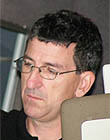|
|
This topic comprises 2 pages: 1 2
|
|
Author
|
Topic: HD anti-piracy code crack leaked online
|
Frank Angel
Film God

Posts: 5305
From: Brooklyn NY USA
Registered: Dec 1999
|
 posted 09-17-2010 09:58 AM
posted 09-17-2010 09:58 AM





MSNBC --
HD anti-piracy code crack leaked online
The software code used to prevent piracy of movies shown on HDTVs, Blu-ray players and set-top boxes appears to have been cracked, with the code for unlocking that "master key" posted on the Internet, first via Twitter.
The news comes at a bad time for the movie industry, which is getting ready to offer films that are still in theaters to folks at home in front of their HD sets, with playback limited by the Digital Rights Management software that has been hacked.
Intel created the piracy-prevention software, called HDCP (High-bandwidth Digital Content Protection). It is used on every device that plays high-def content to prevent copying of movies. A Twitter account, named "IntelGlobalPR" — which clearly is not Intel's — posted a link to a Web page supposedly containing the code to unlock the copy protection "master key."
"How many metaphorical bloody noses will it take before the movie and music industries realize that DRM is a waste of their time — and ours?" (my emphasis) wrote Richi Jennings, who writes about security for Computerworld. "And, as for 'pirates', the futility of DRM is clearly shown by the timeliness and quality of the Blu-ray rips available in BitTorrent and USENET."
"We are, of course, aware of the rumors and stories about this, and we are investigating this as we speak," a spokesman for Intel told msnbc.com Wednesday.
Engadget, one of the first to report the possible breach, said, "Who discovered this and by what technique isn't immediately clear, but as early as 2001 security researcher Niels Ferguson proposed that it could be easily revealed by knowing the keys of less than 50 different devices. Hardware HDCP rippers like the HDfury2 and DVIMAGIC have been around for a while and various AACS cracks easily allow rips of Blu-ray discs ... but if this information is what it claims to be, then the DRM genie could be permanently out of the bag allowing perfect high definition copies of anything as long as the current connector standards are around.
"While it's unlikely your average user would flash their capture device with a brand new key and get to copying uncompressed HD audio and video, keeping those early releases off of the torrents in bit perfect quality could go from difficult to impossible."
| IP: Logged
|
|
|
|
|
|
Mark Lensenmayer
Phenomenal Film Handler

Posts: 1605
From: Upper Arlington, OH
Registered: Sep 1999
|
 posted 09-17-2010 01:05 PM
posted 09-17-2010 01:05 PM




This key will allow non-HDCP compliant devices to properly decode an HDCP stream. If they change the master key, no current HDCP device would work properly, and the manufacturers aren't going to do that.
HDCP Master Key Confirmed Real
quote:
The leaked HDCP master key protecting millions of protected devices, including Blu-ray drives, that was posted to the Web this week has been confirmed as legitimate, Intel representatives said late Thursday.
The disclosure means, in effect, that the content flowing over the encrypted HDMI connection may be recorded and authenticated using an unlicensed device.
Intel spokesman Tom Waldrop said after two days of investigation, the company had informed its partners and licensees that the key, which was posted online on Tuesday, was indeed legitimate.
"We have tested this published material that was on the Web," Waldrop said. "It does produce product keys... the net of that means that it is a circumvention of the code."
As a practical matter, the most likely scenario for a hacker would be to create a computer chip with the master key embedded it, that could be used to decode Blu-ray discs. A software decoder is unlikely, "but I'd never say never," Waldrop said.
"It's really hard to predict 100 percent, but that seems to be the prime scenario," Waldrop said of the possibility that a chip might be created.
Waldrop said that the company has contacted hundreds of its licensees, and still believes that the HDCP technology represents a legitimate protection. Now, however, the content industry will have to turn to legal remedies if pirated material is detected.
The "key" was posted to the Internet on Tuesday, where it was quickly picked up and disseminated via Twitter and other social media links.
HDCP (High Definition Content Protection) is the content encryption scheme that protects data, typically movies, as they pass across a DVI or an HDMI cable. The bitstream now can be recorded and decrypted, allowing an encrypted film to be copied - a huge blow to Hollywood.
HDCP was created by Intel and is administered by Digital Content Protection LLP.
Weaknesses in the HDCP protocol have been known since 2001, when Scott Crosby discovered what he claimed were flaws in the HDCP 1.0 revision. (HDCP is currently in revision 1.3.) Whether there is in fact a master key algorithm, whether that key was published, and whether users could take that key and extract previously encrypted data is unknown.
"I have no way of knowing if this is the actual master secret, but if it is, I am not surprised," Crosby said in an email on Tuesday night. "I am not the only one to predict that this could occur; the master secret can be calculated from the secret keys stored on as few as 40 TV's, computer monitors, video cards, or video players and millions of HDCP supporting video cards and TV's are in people's homes all over the world."
However, the wealth of HD content available for download at pirate sites like The Pirate Bay indicates that pirates have had no problems obtaining copyrighted HD movie data.
The code to unlock DVDs protected by the Content Scrambling System have been known for years, and are protected by the DVD-CCA, which has sued companies like RealNetworks and Kaleidescape that have attempted to market solutions that rip or store DVD content on a hard drive.
The "master key" instructions follow:
"This is a forty times forty element matrix of fifty-six bit hexadecimal numbers," the instructions say.
"To generate a source key, take a forty-bit number that (in binary) consists of twenty ones and twenty zeroes; this is the source KSV," the instructions say. "Add together those twenty rows of the matrix that correspond to the ones in the KSV (with the lowest bit in the KSV corresponding to the first row), taking all elements modulo two to the power of fifty-six; this is the source private key.
"To generate a sink key, do the same, but with the transposed matrix."
| IP: Logged
|
|
|
|
|
|
|
|
|
|
|
|
|
|
|
|
|
|
|
|
|
|
|
|
|
|
All times are Central (GMT -6:00)
|
This topic comprises 2 pages: 1 2
|
Powered by Infopop Corporation
UBB.classicTM
6.3.1.2
The Film-Tech Forums are designed for various members related to the cinema industry to express their opinions, viewpoints and testimonials on various products, services and events based upon speculation, personal knowledge and factual information through use, therefore all views represented here allow no liability upon the publishers of this web site and the owners of said views assume no liability for any ill will resulting from these postings. The posts made here are for educational as well as entertainment purposes and as such anyone viewing this portion of the website must accept these views as statements of the author of that opinion
and agrees to release the authors from any and all liability.
|

 Home
Home
 Products
Products
 Store
Store
 Forum
Forum
 Warehouse
Warehouse
 Contact Us
Contact Us




 Printer-friendly view of this topic
Printer-friendly view of this topic














![[Frown]](frown.gif)
![[Smile]](smile.gif)



